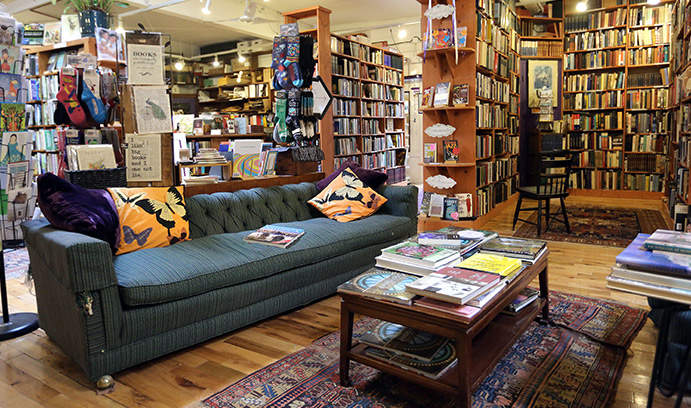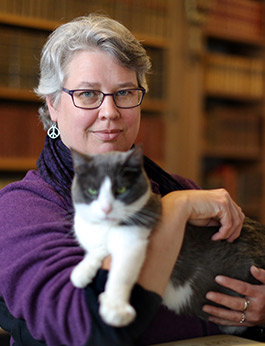A Fiercely Independent Bookstore

Harriett Logan ’89 opened Loganberry Books in 1994 in Shaker Heights, Ohio.
“It’s a place where literature and information are available on a whim. A place where you can find an ever-changing rotation of new ideas and encounters with new literary friends. A place where you will find something you never knew existed that changes your life.”
Harriett Logan ’89 is describing the ideal independent bookstore. She could be describing Loganberry Books, which she opened in 1994 in Shaker Heights, Ohio. One of nearly 2,300 independent bookstores in the United States, it’s a haven for an edible-books contest, an Internet answering service staffed by booksellers and librarians around the country, and a robust collection of approximately 100,000 new, used and rare volumes. Personal service and personality have helped it survive stiff competition from chain stores with chain coffee shops and online mega-markets. None of these goliaths, however, has a giant outdoor mural of shelved books or a mother who triples as a buyer, scout and shopkeeper.
Brenda Logan was her daughter’s first book guru. She introduced Harriett to bookstores, antique stores and first-rate children’s books. Harriett was an elementary schooler in Pepper Pike, Ohio, when she had a memorable encounter with Roald Dahl’s Danny, the Champion of the World, the tale of a youngster who bonds with his widowed father by stealing and drugging pheasants from a mogul’s estate. Initially reluctant to read a “silly” story about a boy, she decided one very early morning that she wouldn’t leave her bedroom until she had finished it.
Five hours later, she emerged from her lair, spellbound. She had lived her future mantra: “A good book is a powerful drug with no due date.”
In high school, Logan began collecting children’s books, rating stores on the quality of their volumes for youngsters. At Lehigh, where she majored in English and theatre, Logan practiced her literary passions. A sort of theatrical Swiss Army Knife, she stage-managed, acted, directed and supervised the Mustard and Cheese Drama Society, and starred in her senior research project. Working with her mentor, theatre professor Augustine Ripa, she learned invaluable lessons about solving problems independently.
Logan stretched her stage wings at the University of Illinois at Urbana-Champaign, where she earned a master’s in theatre history. She accepted her first job in a bookstore, serving a shop named for Jane Addams, the pioneering social worker. She enjoyed every duty: cataloguing, researching, networking. After a period of temping and hiking in Seattle, she returned to Ohio knowing she’d rather run a bookstore than help run a college theatre.
Logan opened Loganberry Books in a 2,000-square-foot space adjacent to an oriental rug store. She named her shop after her nickname, which she had acquired after Touchstone Theatre in Bethlehem hired her as a designated laugher. In 1995 she launched a Web site, a bold move for the rookie owner of a new independent store. Lacking an electronic catalog, she filled the void with a question-and-answer service slanted toward children’s books.
Six years later, Logan doubled Loganberry’s space. In 2003 she moved the store’s 20,000 books into a nearby building with 10,000 square feet. Extra room allowed her to improve the essentials of a good bookstore: comfortable chairs, roomy aisles, diverse stock. “You have to have great depth of field,” she says. “You can’t offer 500 books of fiction and think you have a great selection of fiction. The better your inventory, the longer the browsing.”
Like many bookstores, Loganberry hosts book-club meetings, author readings and lectures on issues; an August session was led by David Greene ’87, a San Francisco lawyer who specializes in First Amendment rights regarding artists and electronic outlets. Unlike many bookstores, Loganberry hosts movies, old-time radio shows and a contest for foods mentioned in or suggested by books.
Loganberry also hosts baby showers, anniversary parties, even weddings. The store has helped turn Larchmere Boulevard, a 10-block business district, into a hub of organic children’s clothes, vegan baked goods and bike racks shaped like antique chairs.
“I like being part of that fiercely independent community of hard-headed people like me,” says Logan, “who want to run their own show.”
Logan has lost countless customers to Barnes & Noble, which offers bigger stores and Starbucks satellites, and Amazon, which offers the convenience of buying printed and electronic books with the click of a keypad. The tide, however, may be turning in her favor. According to the Association of American Publishers, sales of trade e-books fell 14 percent in 2015, the first drop in seven years. According to the American Booksellers Association, the number of independent bookstores rose from 1,651 to 2,311 from 2009 to 2016. The Pew Research Center reports that 67 percent of adults read books in 2016, a healthy figure in an age where many adults prefer text messages to textbooks.
Logan is encouraged by a significant increase in the number of walk-in book sellers, some encouraged by literary treasures they discover on “Antiques Roadshow.” She’s inspired by children charged and changed by new books the way she was when she gulped down Danny, the Champion of the World. She’s more concerned about parents and other adults with the attention span of children.
“They need to stop believing the media storyline that printed books are dying,” says Logan. “Believe me, e-readers won’t put books out of business any more than film will put radio out of business. The issue is not if Amazon is easier or better than an independent bookstore. The real issue is: Where are customers going to ask first? They can send me an email just as quickly as they can contact Amazon. I can get the book for them just as quickly. But if I’m not given the question, I can’t answer it.”
Story by Geoff Gehman ’89 M.A.
Pictures by Lisa Dejong
Posted on:


